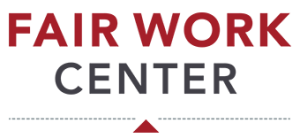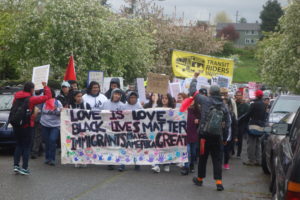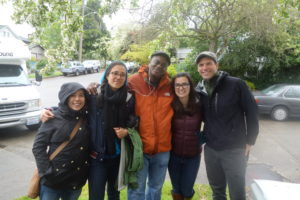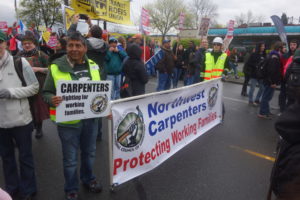May ’17 Fair Work News
Greetings and welcome to the May edition of the Fair Work News, our quarterly e-newsletter.
When I was the victim of wage theft years ago, I made the decision to ignore it. I didn’t know what to do or where to go. Asking for your rights shouldn’t be so hard, and it shouldn’t incite fear over losing your job. But it was hard and it did make me scared. Every worker should have the power to say to her boss, “Hey, my paycheck’s a little short,” or, “I need to be out sick today,” without fear of retaliation. I didn’t realize it at the time, but what I needed was a Fair Work Center.
Two years ago, we set out to build an organization to ensure every worker in our region knew their rights and had the tools and resources to enact them. Today we are continuing to grow as an organization and expand our reach. We will soon have 10 staff. In our new contract with the Seattle Office of Labor Standards, we have 12 community partners committed to training workers 22,000 workers together. And we have a thriving legal clinic that has already supported hundreds of workers to achieve their rights on the job. In this newsletter, we provide updates on two cases that the legal clinic recently closed and two more that we are currently working on.
But there is so much more to do. Earlier this week, we marched with thousands of people for worker and immigrant rights on May Day – International Workers Day. It’s a day for solidarity among workers across the country, but it also highlights the barriers to sustainable, fair work for immigrants in our country. If your immigration status is tenuous, retaliation on the job could result in tearing your family and your life apart.
Fair Work Center is digging hard into the work of making sure our labor laws are implemented well and benefit everyone, regardless of national origin, primary language, physical ability, gender or race. We are working to make sure that Washington State’s new minimum wage and paid sick leave laws protect workers against retaliation and provide real remedies for workers when they are wronged. We are also launching a series of roundtable discussions to help government agencies identify and enforce labor laws while protecting the identity of workers – thereby adding another layer of protection from retaliation.
Finally, I am excited to announce that we are launching a new leadership program for workers we engage with through our outreach, education and legal services. The Worker Power Training program will deepen workers’ understanding of labor and employment law, build workers’ skills for supporting and advocating for each other, and connect workers to others who are equally passionate about these issues. The story of Amina and Ahmed in this newsletter is a perfect example of how workers gain power by standing together.
Thank you for your continued support of Fair Work Center.
In Solidarity,
Nicole Vallestero Keenan
Executive Director














